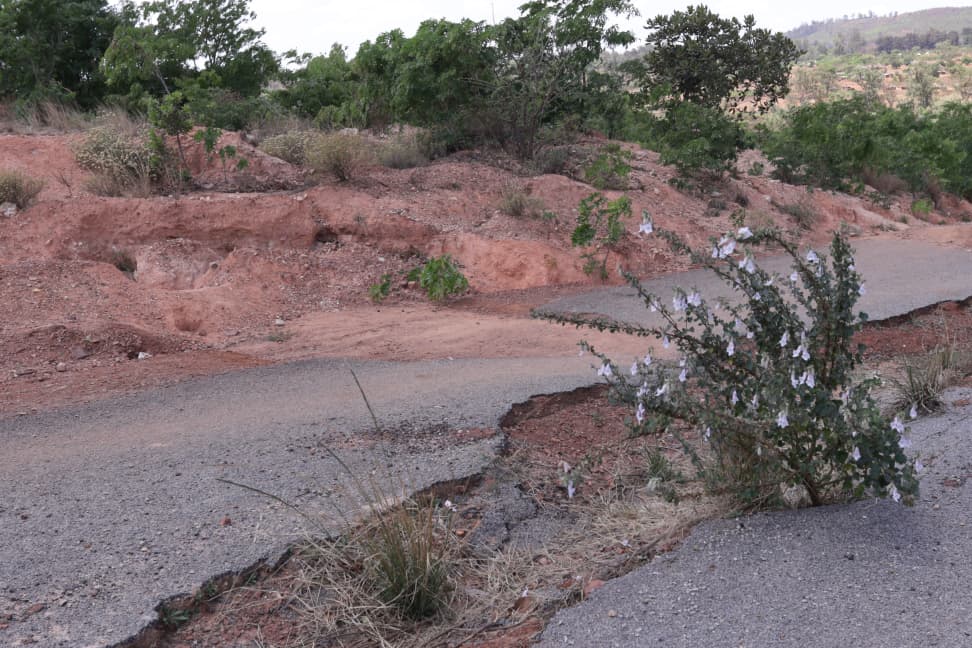Part of a tarred road destroyed by illegal miners in the scenic Impali area
Stephen Chadenga
Shurugwi town, located along the Great Dyke is endowed with rich mineral deposits, chief among them the precious metal, gold.
The mining town, with a population of approximately 23 304 people, according to the 2022 census, is known for mining activities and as a once-magnificent scenic location before decades of land degradation by illegal miners.
Growing at a rate of 2% annually, Shurugwi reflects an urban settlement expanding with increasing demand for housing among its population.
According to Shurugwi Town Council secretary, Archibald Ncube, the urban area has a housing backlog of 23 000 units, a situation he said has driven the local authority to intensify its urban renewal and housing development efforts to meet the housing needs of the community.
Ncube said his council was complementing government efforts to provide affordable housing and fulfil the constitutional right to shelter as enshrined under Section 26 of the Zimbabwean Constitution. Section 26 of the constitution grants everyone the right to access adequate housing.
The council boss said to fulfil this constitutional mandate, the local authority has partnered with private developers and organisations such as the Mining Industry Pension Fund (MIPF) to implement various housing projects to meet housing demand.
“We have partnered MIPF, which is funding 600 residential stands with modern infrastructure such as tarred roads, water and sewer systems,”Ncube said.
“Other partners include Unki Mines, which is developing 1000 residential stands that feature duplex flats and detached houses for employees and 1400 medium-density stands in Impali, serviced through Build-Operate-Transfer (BOT) arrangements. We have also on board developers like Sheasham Investments, CGM Construction and Masimba Holdings carrying out different housing schemes.”
Ncube said despite these efforts to address housing challenges and provide affordable and sustainable accommodation to residents, the town continued to face structural damage particularly to tarred roads at some of its housing projects as a result of illegal mining activities.
“We have engaged the Ministry of Mines and Mining Development as well as the Zimbabwe National Geospatial and Space Agency to assess the extent of damage incurred in some areas,”he said.
“In extreme cases we have resorted to litigation by issuing summons to the offenders.
“But generally the damage caused by these mining activities is costly to the local authority.”
Council housing and community services officer, Fortune Marevesa echoed similar sentiments saying illegal gold mining was wreaking havoc on the local authority’s housing infrastructure.
Marevesa said miners were digging under serviced land, damaging roads and destabilising the ground meant for housing projects.
“In some areas like Impali, we have pits mined out by illegal miners and they have created trenches stretching across tarred roads, posing safety risks,”he said.
“These illegal activities put both the council’s development plans and safety at risk. Some projects had to be temporarily stopped but we have however continued to engage relevant stakeholders to address this challenge.”
Although no immediate comment could be obtained from Midlands provincial mining director, Tariro Ndlovu, he is on record for publicly supporting efforts to formalise small scale miners and enforce laws that require miners to obtain Environmental Impact Assessment before starting operations.
Allegations of corruption and favouring the politically connected in mining activities have often been levelled against the provincial mining office, which they have however dismissed as “unsubstantiated.”
Over the years government has relied on private sector partnerships in reducing the housing backlog, which currently stands at approximately 2 million.
Illegal mining, as in Shurugwi and other towns and cities in the country has however negatively impacted on efforts to achieve the right to housing for everyone.
Critics however blame government’s inadequate enforcement in dealing with illegal mining in the country.
Kwekwe-based human rights activist Nkosilathi Emmanuel Moyo said it was disturbing that illegal mining on designated housing land continued “unabated” with “little” or “no action from law enforcers.
“If you look at the Shurugwi scenario for example, it’s very clear that council had started developments on its land designated for housing projects,”Moyo said.
“We have these artisanal gold miners who came later and started digging trenches on and underneath serviced infrastructure like tarred roads. As we speak they are mining and reports indicate that some projects have been temporarily stopped.
“Honesty this raises eyebrows on who owns those mining claims since we have not heard of any arrests.”
Moyo said there was urgent need for all stakeholders including government, environmental activists, human rights advocates, civil society and local authorities to have a multi-stakeholder indaba that will put a commitment to “once and for all” put a “brave stop” to illegal mining activities that derail development, pose safety risks and threaten livelihoods.
“It can not be business as usual, the issue of illegal mining threatening the existence of human, animal and plant life should be treated as an urgent matter,”he said.
Midlands provincial police spokesperson Inspector Emmanuel Mahoko however said police can only act when reports are made.
“There is need for people to report on elements engaging in criminal activities so that the law can take it’s course,”he said.
Moyo however maintained that illegal miners exploit political connections with influential figures to evade arrest.
“We have documented cases where illegal miners and syndicates have used connections with influential people to avoid accountability and this has created a culture of impunity,”he said.
The human rights defender said there was need for political will to deal with irresponsible and unsustainable mining that has caused long term safety and environmental concerns.
